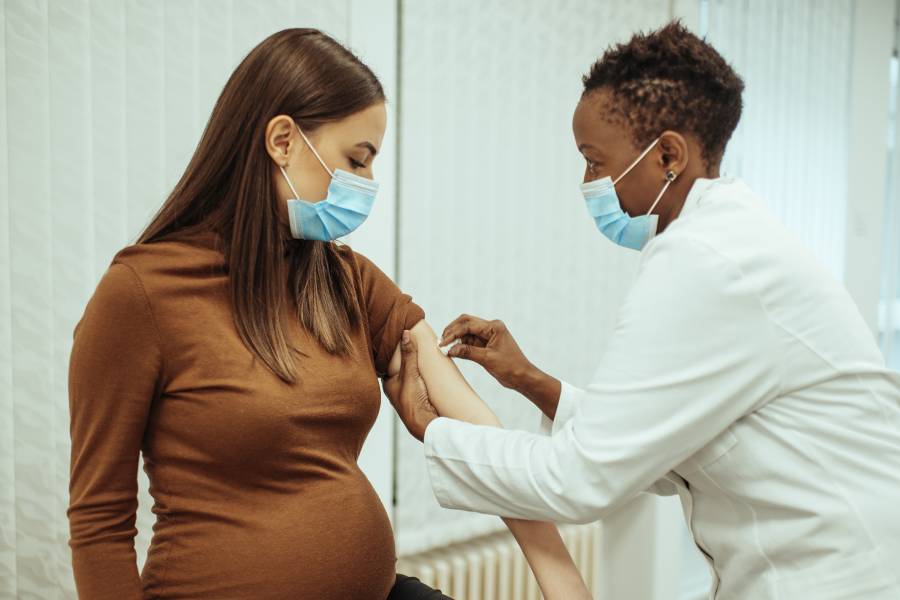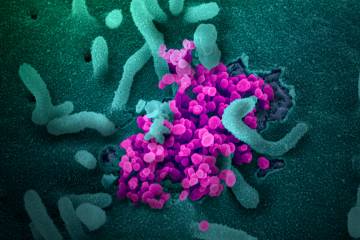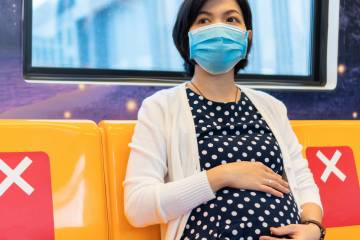With three COVID-19 vaccines now available to the public, a big question remains: Should pregnant and lactating women receive the shots? Though no major studies on this topic have taken place to date, general medical guidance suggests that vaccines authorized by the Food and Drug Administration should not be withheld from pregnant or breastfeeding women.
Two experts from Johns Hopkins Medicine—Andrew Satin, director of gynecology and obstetrics, and Jeanne Sheffield, director of maternal-fetal medicine—offer some guidance below. Their recommendations fall in line with those from major medical organizations, including the American College of Obstetricians and Gynecologists and the Society for Maternal-Fetal Medicine, as well as the World Health Organization, which states that there is no reason to believe that any risks of vaccination would outweigh the benefits for pregnant women. Preliminary developmental and toxicity studies also don't indicate any adverse effects from the vaccines on reproduction or fetal development.
Read on to learn what the expert physicians recommend. These recommendations may evolve as new evidence becomes available, and pregnant and lactating women are advised to talk with their doctors about the vaccination options available to them.
Risk factors to consider
The Centers for Disease Control and Prevention includes pregnant women as a high-risk group for COVID-19. Recent data on pregnant women with COVID-19 shows increases in risks for intensive care unit admission, need for mechanical ventilation and ventilator support, and death, compared to nonpregnant women. Co-morbidities (health conditions that may contribute to death) as well as many racial and socioeconomic factors also may increase risks for severe COVID-19 in pregnant women.
In all cases, it is also important to consider the level of community transmission of the virus in one's area.
Can I get the COVID-19 vaccine while breastfeeding?
Based on available data, it appears safe to get the COVID-19 vaccine if you're nursing a baby. Although the vaccines have not been studied in nursing mothers, medical experts have advised that lactating women should be offered the COVID-19 vaccine. The vaccines do not contain live virus, so being vaccinated does not pose a risk to the baby. If you are vaccinated for the coronavirus, there is no need to delay or discontinue breastfeeding.
Will the COVID-19 vaccine affect my fertility?
No, getting the COVID-19 vaccine will not affect your fertility. Women actively trying to conceive may be vaccinated with the current COVID-19 vaccine—there is no reason to delay pregnancy after completing the vaccine series.
Confusion around this issue arose when a false report surfaced on social media claiming that the spike protein on this coronavirus was the same as another spike protein called syncitin-1 that's involved in the growth and attachment of the placenta during pregnancy. The false report said that getting the COVID-19 vaccine would cause a woman's body to fight this different spike protein and affect her fertility. In reality, the two spike proteins are completely different, and getting the COVID-19 vaccine will not affect the fertility of women trying to become pregnant, including through in vitro fertilization methods.
During the Pfizer vaccine tests, 23 women volunteers involved in the study became pregnant, and the only one in the trial who suffered a pregnancy loss had not received the actual vaccine, but a placebo.
Can I get COVID-19 from the coronavirus vaccine?
No, you can't catch COVID-19 from the currently available vaccines. You may experience mild, temporary side effects, but this is an indication of the immune response to the vaccination and not the development of COVID-19.
Learn more about COVID-19 vaccines, their safety and side effects, and what to expect if you choose to be vaccinated online.
This article was adapted from a fact sheet produced by the Johns Hopkins School of Medicine.
Posted in Health
Tagged pregnancy, coronavirus, covid-19 vaccine










